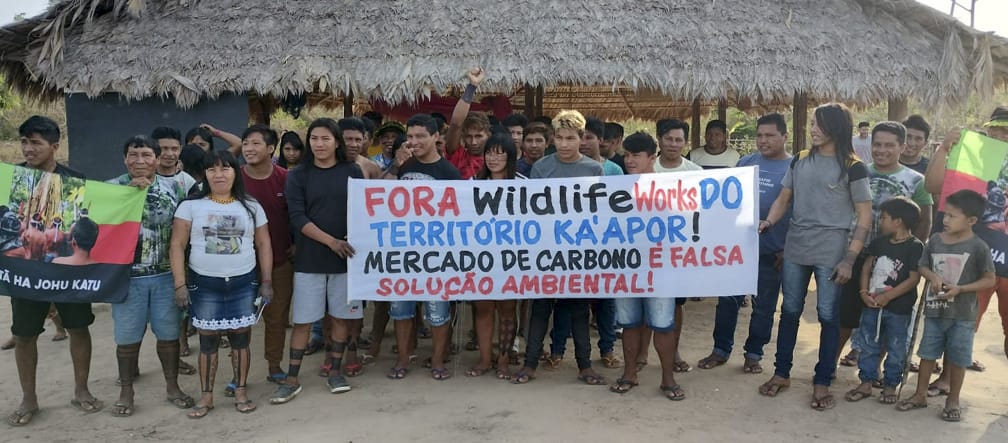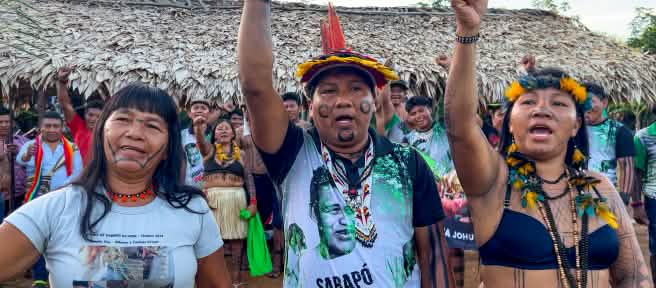
Brazil: Keep US carbon traders OUT of the Ka’apor rainforest!
The US company Wildlife Works wants to use the rainforest of the Indigenous Ka'apor people to sell carbon credits against the will of the Indigenous Ka’apor Council Tuxa Ta Pame. The Ka’apor have preserved their forest and don’t want to commodify it. Wildlife Works is causing and deepening internal conflicts within the community.
News and updatesTo: Minister of Indigenous Peoples, Sonia Guajajara; President of FUNAI, Joenia Wapichana; Coordinator of the 6th Chamber of the Attorney General's Office - Indigenous Peoples and traditional communities
“The Brazilian government must ban Wildlife Works from entering the Indigenous Ka'apor territory.”Since 2023, the Indigenous Ka’apor Council Tuxa Ta Pame has deplored the actions of the US company Wildlife Works, which wants to use the 531,000-hectare Indigenous territory of Alto Turiaçu in the Amazon region to generate carbon credits and sell them.
Carbon credits can be used, for example, by oil or airline companies to give themselves a green veneer, even though they emit CO2 into the air and continue to damage the climate and the environment.
The Ka'apor have preserved the rainforest in Alto Turiacu to this day and actively defend it against deforestation by timber companies, cattle farmers, poachers and mining companies, despite constant threats.
They understand that the forest is life, which is why they respect it in all its forms of existence, whether in the form of the forest, the waters, the animals or the spirits that live there.
Because of the project to sell carbon credits, people linked to the company enter the forest where the Ka'apor live and hold meetings to persuade the population to approve the project, promising millions of dollars in funding.
Tuxa Ta Pame is against the project and has filed a complaint with the Federal Public Prosecutor's Office and the state Indigenous authority FUNAI, accusing Wildlife Works of not obtaining free, prior and informed consent from all the Ka'apor people, as required by Convention 169 of the UN International Labor Organization.
The activities and promises also lead to serious tensions and internal conflicts among the Indigenous people, which jeopardizes their efforts to protect the rainforest and defend it against intruders. And because of their opposition to Wildlife Works' project, the members of Tuxa Ta Pame are receiving threats.
Start of petition: 05/05/2025
To: Minister of Indigenous Peoples, Sonia Guajajara; President of FUNAI, Joenia Wapichana; Coordinator of the 6th Chamber of the Attorney General's Office - Indigenous Peoples and traditional communities
Ladies and Gentlemen,
For two years, the leaders of the Ka'apor Indigenous Council Tuxa Ta Pame have been complaining to the Federal Public Prosecutor's Office (MPF) and FUNAI about rights violations on their territory in Maranhão by the US company Wildlife Works. According to the lawsuits, the company wants to carry out a project to generate carbon credits on the Indigenous land of Alto Turiaçu in the Amazon region in violation of national and international laws.
In January 2024, Tuxa Ta Pame officially informed the company in a letter that it did not accept the presence of foreign persons in connection with the carbon credit project on the land and demanded the immediate withdrawal and cessation of all activities.
In Tuxa Ta Pame’s view, Wildlife Works has not obtained free, prior and informed consent for the project from all Ka'apor, as required by Convention 169 of the UN's International Labor Organization (ILO), which Brazil has ratified.
Despite all of this, the company continues to hold meetings and gatherings in various villages in the area and disregards the decisions of the Indigenous leaders. Wildlife Works' activities and promises also lead to conflict among the Ka'apor, making the area, which has suffered for decades from encroachment by loggers, poachers and ranchers, even more vulnerable.
Tuxa Ta Pame states that Wildlife Works began encroaching on the Indigenous land of the Ka'apor when the company was not even registered in Brazil - which the Council deems illegal.
In light of the deteriorating situation, in October 2024, Tuxa Ta Pame filed a lawsuit in Federal Court against Wildlife Works, the Indigenous authority Funai and the federal government. It called for a halt to any and all of the company’s activities in Alto Turiaçu and for the federal government and Funai to carry out inspection and control actions in the Ka'apor territory, preventing the entry of national and/or foreign companies that promote carbon credit trading, especially as there are no standards for this in Brazil.
We respectfully urge Your Excellencies to take immediate action. The Indigenous Ka’apor Council Tuxa Ta Pame requests the prevention of the company’s entry onto Indigenous land and the ongoing violation of the Ka’apor people’s rights within their territory.
Yours faithfully,
Rainforest Rescue, 2023. Brazil: US company causes conflicts among indigenous Ka'apor with planned carbon trading project: https://www.rainforest-rescue.org/updates/11898/brazil-us-carbon-traders-stoke-conflict-among-indigenous-kaapor
Rainforest Rescue, 2024. Indigenous Ka'apor complain about attacks by traders of carbon credits in their rainforest:https://www.rainforest-rescue.org/updates/11993/brazil-indigenous-kaapor-people-denounce-abuses-by-carbon-traders
531,000 hectares is the equivalent of 5,310 square kilometers, which is more than twice the size of the Saarland (2,570 km² )
International Labor Organization (ILO) of the UN. Indigenous and tribal peoples: https://www.ilo.org/topics-and-sectors/indigenous-and-tribal-peoples
